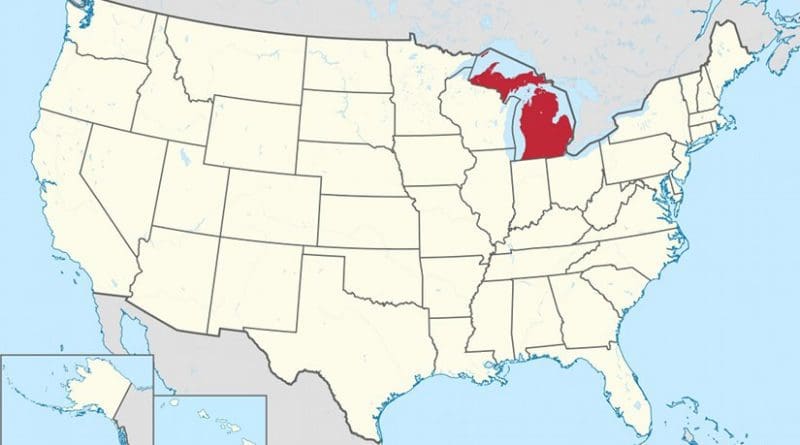Patrick Buchanan: The Fall Of The House Of Labor – OpEd
In 1958, Senate Minority Leader William Knowland, his eye on the 1960 GOP nomination coveted by fellow Californian Richard Nixon, went home and declared for governor.
Knowland’s plan: Ride to victory on the back of Proposition 18, the initiative to make right-to-work the law in the Golden Land. Prop. 18 was rejected 2 to 1. Knowland’s career was over, and the Republicans were decimated nationally for backing right-to-work.
Badly burned, the party for years ran away from the issue.
This history makes what happened in Michigan, cradle of the United Auto Workers, astonishing. A GOP legislature passed and Gov. Rick Snyder signed a right-to-work law as libertarian as any in Red State America.
The closed shop, where a worker must belong to the union before being hired, is dead. The union shop, where an individual must join the union once hired, is dead. The agency shop, where a worker cannot be made to join a union but can be required to pay dues if the union is the agent negotiating the contract for all workers, is dead.
Michigan just legislated the open shop.
And behind the blue-collar bellicosity in Lansing is this new reality. Non-union workers can now “free ride” on union contracts. This is close to a non-survivable wound for labor.
Workers who do not belong to unions will cease paying dues, and union members will begin quietly to quit and pocket their dues money.
Why pay dues if you don’t have to? Why contribute a dime to a union PAC if you don’t have to, or don’t like labor’s candidates?
Michigan workers are not going to suffer. They have simply been given the freedom to join or not join a union, to pay or not pay dues. And while wages in right-to-work states such as Virginia, Tennessee, Texas and Florida are slightly below those of other states, employment in right-to-work states is higher.
For these are the states where domestic and foreign investors look to site new plants. The BMW assembly plant is in Greenville-Spartanburg, S.C., the Mercedes plant in Tuscaloosa, Ala., the Volkswagen and Nissan plants in Tennessee. As Gov. Rick Perry boasts, Texas has been the biggest job creator in the Obama recession.
But union power is going to be circumscribed as non-union workers elect to free-ride and union members start resigning. And just as Michigan saw Indiana creating jobs after passing right-to-work, other states may observe Michigan and go forth and do likewise.
There are now 24 right-to-work states. But while these laws arrested the rise of the house of labor, there was an inevitability to its fall. Who are the collective killers? Like the murder on the Orient Express, just about everyone on the train.
First came automation. A third of U.S. workers were unionized in the 1950s. But with new technologies, we discovered we did not need so many men to dig coal, make steel or print newspapers. We did not need firemen riding in the cabs of diesel locomotives.
A second blow came with the postwar rise of Germany and Japan. Their plants and equipment were all newer than ours. Their wages were far lower, as they did not carry the burden of defending the Free World. Under our defense umbrella, they began to invade and capture our markets.
And Uncle Sam let them do it.
A third blow to Big Labor, concentrated in the Frost Belt, came from the Sun Belt. With air conditioning making summers tolerable, the South offered less expensive and more reliable labor than a North where union demands were constant and strikes common.
But the mortal blow to American unions came from globalization.
With the collapse of communism in Eastern Europe, the Soviet Union and China propelling hundreds of millions of new workers into the global hiring hall, U.S. multinationals saw historic opportunity.
If they could move factories out of the U.S.A., they would be free of union demands, wage-and-hour laws, occupational health and safety laws, environmental laws and civil rights law. By outsourcing, they could produce for a fraction of the cost of doing so in the U.S.A.
And if they could get the U.S. political class, in return for corporate generosity at election time, to let them bring their foreign-made goods back to the U.S.A., tax and tariff free, profits would explode, and salaries and bonuses with them.
The corporate establishment and political establishment shook hands, the deed was done, and the fate of U.S. industrial unions sealed. So came NAFTA, GATT, the World Trade Organization, MFN for China, free trade with all.
And with globalization came trade deficits unlike any the world had ever seen, a loss of one-third of U.S. manufacturing jobs in the last decade, a U.S. dependence on foreign-made goods almost as great as in colonial days, the enrichment of our corporate and financial elites beyond the dreams of avarice, and the decline and fall of the house of labor.
Unions are dying because, in America, economic patriotism is dead.

